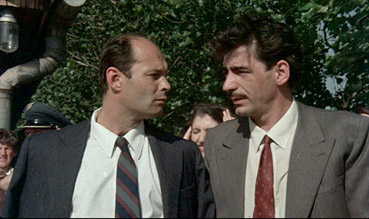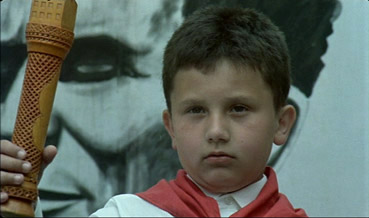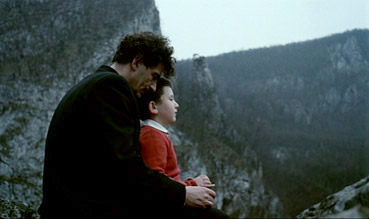|
It's
a familiar favourite in modern political dramas, the ordinary
guy living in a communist state who says the wrong thing
and is whipped off to an internment camp. The roots of such
stories are factual, of course, and highlighting the injustice
of the oppression of free speech is both valid and important,
but is often observed in simplistic terms – say something
even remotely anti-communist and you're for it, mate. It's
typical of Emir Kusturica's second feature, following on
from the wonderfully observed Do
You Remember Dolly Bell?, that in exploring
this concept he partially inverts it. Here the unknowing
Mesa Malkoc is arrested not for his anti communist sentiments,
but his pro-communist ones.
This
is Sarajevo in 1950, two years after Yugoslavia was expelled
from the Communist Information Bureau as a result of increasing
disharmony between Josip Tito and Joseph Stalin and a refusal
on Tito's part to toe the Moscow line. Following the split,
those who had supported the Russian revolution and continued
to express pro-Russian sentiments (known as "Cominformists")
soon found themselves intimidated into silence or shipped
off to prison camps to re-evaluate their beliefs.

Initially
all this is background detail to Kusturica's tale, alluded
to in voice-over by Mesa's six-year-old son Malik, whose
best friend Joza's father was taken away by "men in
leather coats" after proclaiming publicly "I'd
rather have Russian shit than American cake!" It is
from young Malik's view that the story is primarily – though
not exclusively – told. His understanding of the arrest of
Joza's father is only that "it was something to do
with Stalin."
We
are shown up front that the unfortunate Mesa is no saint.
A devoted father to Malik and the owlish Mirza, he is nonetheless
having an affair with the gym teacher Ankika, who is furious
at him for continually failing to divorce is wife Sena,
something he clearly has no intention of doing. Ankika's
annoyance eventually leads her into the arms of Mesa's brother-in-law,
a high ranking party official, to whom she repeats an offhand
remark made by Mesa against a newspaper cartoon lampooning
Stalin. In no time at all Mesa is called to Party headquarters
and shipped off to a gulag. Young Malik, who has little
understanding of such things, is told that his father is
"away on business."
If
Kusturica's debut feature was a surprise for those coming
to it retrospectively from his later work, then When
Father Was Away on Business will prove doubly so.
Displaying none of the madcap eccentricity of the post-Time
of the Gypsies films, When Father Was Away
on Business plays its drama largely straight, the
light-hearted moments being believably and engagingly character
based. There is little joy of innocence in Malik's view of events, more a sadness at his father's absence
coupled with at the complexities of growing up, physiologically
manifested in his episodes of sleepwalking, which alternately
place him in physical peril and at the house of the young
girl he has fallen in love with. Typical of European cinema
of the period, this relationship is handled with honesty
and sensitivity and not wrapped in a blanket of coyness.

How
the family cope with Mesa's absence, with the lack of news
of his whereabouts and the strain it puts on Sena in particular,
becomes the focus of the film's midsection. Our involvement
with them is such that an eventual visit to the camp in
which Mesa is held proves an emotionally powerful reunion,
and following his release the sadness that accompanies the
family's forced departure from Sarajevo is poignantly realised.
But even here Kusturica avoids the obvious, with Mesa as
unfaithful to Sena as ever, and a later family reunion proving
a compelling mixture of the uncomfortable and the unexpected,
with the occasional moment of real emotional pain (in one
extraordinary example, whose details I cannot divulge, the
mood switches from tragic to comic and back again in the
space of a few seconds). The
result is a moving, vivid, but never sensationalist picture
of a family struggling to maintain its cohesion, all affected
negatively in some way by a system whose only real function
seems to be to protect itself at any cost.
The
film also most effectively illustrates the absurdity of
the oppression of free speech and any system used to try
and enforce it, a message too often associated only with
countries and political systems that are not our own. Many
times I have heard the argument in favour of greater powers
being given to police and government agencies to investigate
private citizens being qualified by the suggestion that if you
have nothing to hide then you have nothing to worry about,
naïvely simplistic reasoning that takes no account of the
human factor. Mesa's arrest for an ultimately innocuous
remark is clearly ridiculous, but such draconian restrictions
on free speech inevitably result in a system that is open
to serious abuse, and all it takes here is one offhand comment,
one disgruntled ex-girlfriend and one jealous brother-in-law
to see that system misused for personal ends. Kustirica's
final message seems targeted deliberately at those who would
enforce the silence, suggesting that even in a system with
no legal redress, there is still a heavy moral and spiritual
price to be paid for their actions.
As
with Artificial Eye's simultaneous release of Do
You Remember Dolly Bell?, the framing is 1.66:1,
but here the picture is not anamorphically enhanced. The
positive trade-off is that the image quality is noticeably
superior, a more solid source print clearly having been
used for the transfer. Contrast and detail are for the most
part very good – only an early scene with Mesa and Ankika
on a train displays weakness in these areas.

The
Dolby mono 2.0 track is serviceable, though is a little
crisp on some of the dialogue trebles.
The Emir Kusturica interview (18:07)
was clearly conducted in the same session as the one on
the Dolly Bell disc and is similarly interesting,
with the director discussing the European feel of the film
and the importance of not pandering to western expectations,
amongst other things.
There
is also a concise Emir Kusturica Biography
and the same Trailers for Black
Cat, White Cat (1:35), Underground
(1:04) and Life is a Miracle (1:41) that
you'll find on the Dolly Bell disc.
A very different film to the fast-paced, eccentric comedies
that would later become a Kusturica speciality, When
Father Was Away on Business is a thoughtful, involving
and movingly human story that continues to be relevant in
a world where those who speak freely can still find themselves
silenced by the might of governments, religion or multi-national
corporations. It remains one of the director's most highly
regarded works and landed him the Palme D'Or at Cannes
in 1985, a feat he was to repeat ten years later with Underground.
Artificial
Eye's DVD is a decent enough if unspectacular job, gaining
points for the picture quality but losing a few for being
non-anamorphic, though it pulls a couple back again for
the Kusturica interview. The film itself is the draw here,
and that's a winner.
|